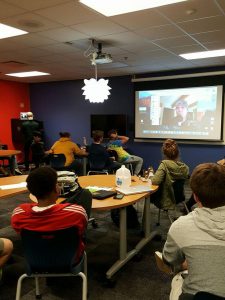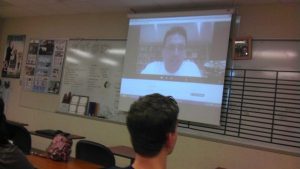EDITORIAL OVERVIEW – ISSUE 19
LAUNCHING THE EDTECH PODCAST FESTIVAL!


Robyn Shulman is founder and editor of EdNews Daily, a contributor to Forbes focusing on education and entrepreneurship, and a proud media partner of the Reimagine Education Awards & Conference. This interview was originally featured in Forbes.
Don Wettrick is a high school teacher, and an Innovation Coordinator at Noblesville High School, just outside of Indianapolis, Indiana.
Wettrick has worked as a middle school and high school teacher, as well as an educational and innovation consultant and speaker.
He’s passionate about helping students find educational and entrepreneurship opportunities, while providing them with the digital tools they need to give them a competitive edge. He’s lectured across the US and Europe about collaboration, youth entrepreneurship, social media use, and work environments that enable innovation.
He’s the founder of StartEdUp, the only global network of innovators, educators and some of the most well-known entrepreneurs to date in the education system.
He’s one of the few teachers I’ve ever met who brings education, hands-on entrepreneurship, real-world change, innovation, and collaborative skills into his classroom. Famous entrepreneurs such as Daniel Pink, Tim Ferris, Gary Vaynerchuk, Dr. Tina Seelig, Amy Wilkinson, Tom Bilyeu, Seth Godin, and James Altucher have taken an interest, endorsed, or worked with Wettrick and his students.
As he brings together education, innovation, and entrepreneurship, he’s made his classroom a safe place to fail. His students have built apps, filed for patents, started their own businesses, made changes in their community, and continue to grow on their path toward self-discovery.
Wettrick is considered an icon in his field. I recently reached out to interview and learn more about his work. In this interview, which has been edited and condensed, Wettrick shares his story about his classroom, StartEdUp, his students, the challenges he faces in the traditional education system, and the work he’s doing with famous entrepreneurs.

Robyn Shulman: Don, please tell me about you and your educational background.
Don Wettrick: I’m the son of an educator, so growing up I was always interested in education, and the need for change. When I told my dad I was going to be a teacher, he said, “Don, I don’t care if you teach for the next 20 years, but promise me you won’t teach one year 20 times.”
Shulman: Did your father’s statement have an affect on your current work?
Wettrick: Yes, to me, that has been at the heart of education and innovation. Not clinging too tightly to the “tradition” of education, but instead constantly adapting to the needs of the students and the changing landscape of employment in the world.
Shulman: Why and how did you create StartEdUp?
Wettrick: I created StartEdUp after the launch and success of my Innovation and Open Source Learning class, which was the start to helping kids “unlearn,” through traditional means. Schools began inquiring about how they could start a program like ours.
Shulman: How did you spread the word?
Wettrick: In the beginning, I was consulting on location, and then spending my weekends flying to schools in different states, or my summers driving to conferences. It started to affect my health.
Shulman: What did you do to move things forward?
Wettrick: My former student, Hunter Stone, convinced me to provide digital resources that would reduce the in-person consulting.
He said, “You have a 1990’s business model. We can build a large digital platform so that we can reach more students, and you don’t have to travel and be away from your family as much.”
He became my co-founder the next day. Since then I have added three more to the team.
Shulman: If it hadn’t been for the Internet, I wouldn’t have seen your work. Are you running a company with StartEdUp?
Wettrick: StartEdUp eventually grew into a media company of sorts. A good friend of mine, Kevin Bailey, gave me the advice to start focusing on our podcast. We were already working with famous names, so we use our podcast to reach students who need to learn about innovation and entrepreneurship for students outside of the district walls.
Shulman: How did you grow? What tools did you use to spread your message?
Wettrick: I was already a fan of Gary Vaynerchuk, so the “every company is a media company,” mantra made sense. I doubled down on the podcast, culminated our community on a Facebook page, and leveraged my Twitter account as a tool to promote our educational mission.
Shulman: What was your “a-ha moment,” that inspired you to move from mainstream teaching to an innovative classroom?
Wettrick: Seven years ago, I watched Daniel Pink’s TED talk, and it was an awakening. While his discussion centered around what motivates employees, the basics of freedom, mastery, and purpose also crossed over to students as well. Instead of not wanting to work “just for money,” students, in the same way, shouldn’t learn just “for the grade.”
Shulman: What did you do?
Wettrick: One day after I watched the TED talk, I had my then Freshmen English class brainstorm how they would carry out a free “20% Time” in class. Two weeks later I had the opportunity to talk with Mr. Pink, and he Skyped into our class to discuss the importance of this new approach to learning.
Shulman: Schools can be resistant to change. How did you get everyone on-board?
Wettrick: At first, this approach to learning was limited to 20 minutes every Friday. However, I realized that this wasn’t enough time. I wanted this to be an elective and allow our students an opportunity to pursue learning that they were passionate about.
Shulman: And so the class began. How did the students react?
Wettrick: At first, I was horrified at how our students only wanted to complain about school not being relevant, but not put in the work. Also, one of the most significant issues was getting students to identify a problem they wanted to solve, or find their passion.
Shulman: As you noted in your interview with Tom Bilyeu, you had to teach your students to “unlearn,” from the traditional school way. How did it go at first?
Wettrick: In the beginning, many of my students were pitching great ideas but then would worry about what the grade would be if they tried something that failed.
The fear of failure I saw in the students is when I knew there was a fundamental problem with rewarding grades and compliance vs. learning through experimenting (aka-failure).
Your Students

Shulman: Can you briefly walk me through a day in your class through the eyes of your students?
Wettrick: This is the class where students are allowed to pursue what they find interesting. It is a place where they can fail and adjust. They learn and work with finding outside experts and mentors.
Shulman: What is it like sharing your classroom with the world?
Wettrick: Opening our students up to a more prominent network has been one of the most beneficial parts of the class. They’ve been able to learn from (and in some cases get funding) from entrepreneurs, authors, leaders, and non-profits from all over the world.
Shulman: What do the students do when they’re in your class?
Wettrick: The students sketch out a plan in the beginning. Then they get feedback and ultimately approval from me to carry out a project. Next, I have them find the mentors, as I mentioned earlier. Mentoring allows the students to bounce off ideas and get more authentic feedback.
I have them work in two-week cycles to carry out projects and get feedback and adjust. This timeframe gives the student the bandwidth to set a 14-day goal, carry it out, and then reflect on the progress.
If they see that the project isn’t working, they adjust. If they reflect that things are too easy, they change. If they find that things are going as planned, then I help them turn up the heat.
Shulman: What types of businesses, products, and services have your students developed and launched?
Wettrick: This year two of our students, Luke Reks and Luke Johnston, have started their own NGO-the ChangED project. They raised enough money to start a school in Ghana, and maintain it through their NGO. Luke Johnston just moved out to Cape Coast Ghana to oversee the building of the school and ensure its sustainability.
Shulman: How about in business and media?
Wettrick: We also had students launch apps, host events, inquire and file for patents, launch businesses, and start non-profits. One student set up a social media consultancy business for local businesses.
We’ve got several students that host podcasts, and YouTube channels.
Most importantly, these projects are rather important to them. One student wanted to start a technology help-desk at the local library. Another team researched and launched an e-sports team because they were passionate about the sport, but also because it is such a tremendous opportunity.
Shulman: How about when they fail?
Wettrick: We’ve had several students launch products and companies that didn’t work out, and that’s okay. I encourage them to take these risks now. The failed business ventures were critical learning opportunities, and at this age didn’t have the downsides of declaring bankruptcy or losing a house. Instead, many of the students that have “lost,” have made a pivot or two-which is an education in and of itself.
Shulman: Tell me about your podcast.
Wettrick: On New Year’s Day 2017, I launched my podcast where I set out to interview my heroes of education. In fact, it started when Tim Ferris called our classroom. We often reach out to entrepreneurs and thought leaders to provide some insight, and we were lucky enough to talk with Tim via Skype.
Shulman: How did your co-workers react to the name Tim Ferris?
Wettrick: When I announced that our class was going to interview Tim, most of my teacher friends had no idea who he was. I thought more teachers should know who people like Naveen Jain, Tim Ferris, and Seth Godin were.
They all had insights into what education needs, so I thought a podcast about education-without any educators might be an excellent disruptive podcast.
Shulman: Who else have you interviewed?
Wettrick: In the past year, I’ve had the opportunity to interview names like Naveen and Seth, but also exciting thought leaders like Jocko Wilink, Gary Vaynerchuk, Amy Wilkinson, James Altucher, and Jon Fortt.
Shulman: How did you get such highly esteemed entrepreneurs to endorse your work? How did you get their attention toward education?
Wettrick: Seth, Gary, Daniel Pink, and Rick Fox are probably the most notable. I think I got their attention because too often people complain about what we should do about education, but very few teachers are allowed to take these risks-and they can see and hear about our work through platforms like the podcast, website, and our Facebook page. I also think they respect what I’m doing because I also created my entrepreneurial track through StartEdUp.
Reaching Educators
Shulman: You are the epitome of a 21st-century teacher. Tell me how other educators are responding toward student-centered teaching and innovation?
Wettrick: I’ve seen many educators understand and support the innovation focus as evidenced by the “Genius Hour,” movement. I’ve seen many schools, especially at the elementary level, provide time for the students to experiment and create.
Shulman: How about resistance to such a shift in education?
Wettrick: I’ve also seen a lot of resistance as well, and I understand why. Many K-12 educators believe that the college route is the route, and that it is a risk to steer students away from that.
In fact, one of my biggest goals for StartEdUp is to educate the parents and teachers on the changing landscape of employment opportunities. According to many sources, nearly half of the world’s jobs will be freelance or part of the “gig economy.” But are we offering training on how to pursue these opportunities? Most aren’t.
Shulman: Education can move slowly when it comes to making changes in the classroom for various reasons. How do you convince teachers that these changes are critical for the future?
Wettrick: I think many educators understand that we have to adapt education to the changing demands of the employment world. However, the hard part is getting the “educational system” to move faster.
Robyn Shulman is a certified K-9 teacher, and the Senior Editor for 51Talk, China. She is also the founder of EdNews Daily, a resource for teachers, parents, edtech entrepreneurs and startups. This article is reproduced with her permission, and can be accessed in full at https://www.forbes.com/sites/robynshulman/2018/01/17/endorsed-by-entrepreneurs-how-this-high-school-teacher-is-making-the-classroom-a-safe-place-to-fail/2/#20241054486f.

